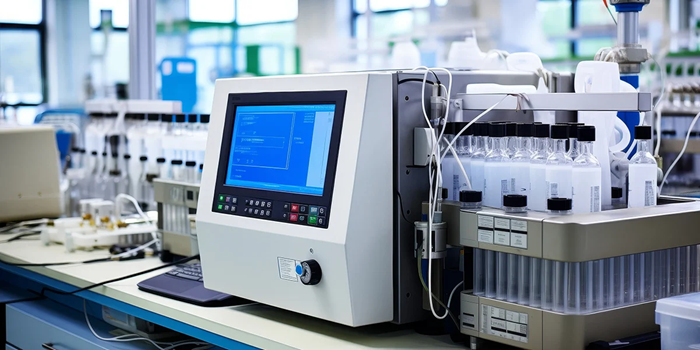In today’s fast-evolving technological landscape, precision and reliability in measurement and analysis are more important than ever. Accurate data collection and interpretation are essential for delivering dependable results.

Image Credit: Fluid Metering, Inc.
This article will outline some of the key applications of analytical equipment—and how Fluid Metering pumps are providing accurate, repeatable solutions to meet challenges across a range of industries.
Leading Industries
Analytical instruments underpin the measurement, monitoring, and control of a diverse array of processes in a wide range of industries.
- Energy: The petrochemical industry leverages process analyzers to investigate the composition of natural gas, crude oil, and its derivatives at different stages of the refining process. Process analyzers are also central to quality control and the environmental monitoring of emissions generated during extraction and routine operation.
- Environmental: Environmental laboratories and consulting firms make use of analytical equipment to evaluate water, air, and soil quality. These organizations also work with local, state, and federal agencies to monitor progress in water treatment projects.
- Agriculture: Farmers, horticulturalists, and field technicians analyze soil and plant samples to assess nutrient content and detect pesticide residues. They also conduct water sample analysis to ensure optimal quality and support ideal growth conditions.
- Diagnostics and IVD: Diagnostic testing, disease monitoring, and related research rely on a wide range of instruments, including mass spectrometers, flow cytometers, and various analyzers such as immunoassay, clinical chemistry, hematology, electrolyte, urine, and microbiology analyzers.
- Biotechnology: Proteomics, genomics, and metabolomics leverage analytical instruments such as mass spectrometers, DNA sequencers, flow cytometers, and PCR machines to analyze biological samples and better understand cellular processes. OEM machines are key to pharmaceutical drug development and testing, enabling the determination of chemical composition, purity, and the presence of contaminants.
- Food and Beverages: The food and beverage industry uses analyzers for safety testing, quality control, and nutritional analysis.
- Cosmetics: Cosmetic companies employ analytical devices to test for product safety, quality, and formula consistency.
Effective Tools
Choosing the right equipment and adopting innovative methodologies can significantly improve the accuracy of results. Three noteworthy analytical methods include:
1. Mass Spectrometry
Process analyzers like mass spectrometers offer continuous, real-time monitoring of solids, liquids, and gases. Striking a balance between sensitivity and resolution remains one of the biggest challenges in designing these instruments, but Fluid Metering pumps offer precise measurement solutions for both liquid and gas applications.
Incorporating these pumps into mass spectrometers helps to improve the accuracy and reliability of readings, ensuring optimal process control and safety.
2. Water Quality Monitoring
Water quality is a critical concern across numerous sectors. Providing reliable solutions for monitoring and analyzing water parameters is essential to support both environmental and public health.
One of the key challenges in developing efficient water quality analyzers is the need for frequent recalibration.
Fluid Metering pumps address this issue by maintaining 0.5 % precision over millions of cycles without the need for maintenance or recalibration. This ensures stable, long-term performance—helping to support safety and regulatory compliance in water assessment and treatment processes.
3. Low-Pressure Liquid Chromatography (LPLC)
Pressure drops and other pressure-related issues typically arise when designing chromatography machines. Fluid Metering pumps are able to maintain consistent flow and pressure, enabling precise flow control and ensuring the ideal mixing ratio for fluid dilution. These pumps’ low shear, non-destructive capabilities also make them suitable for working with delicate samples.
Summary
The importance of real-time precision and reliability in measurement and analysis cannot be overstated in today’s analytical landscape. Advanced solutions are meeting the unique challenges faced by industries across the board.
By leveraging advanced Fluid Metering pump technologies, OEMs can ensure accurate, reliable, and efficient performance in their mass spectrometers, water quality analyzers, and low-pressure liquid chromatography machines.
Acknowledgments
Produced from materials originally authored by Stephanie Moreau from Fluid Metering, Inc.
About Fluid Metering, Inc.
Fluid Metering, Inc. (FMI) is a worldwide leader in life science pumps and dispensers, having pioneered the first valve-less piston pump over 64 years ago. With specialized expertise in fluidics and applications, Fluid Metering, Inc. supports instrument developers in tackling complex fluidic challenges.
Committed to innovation through collaboration, Fluid Metering, Inc. advances health, sustainability, and quality of life. ISO 9001:2015 certified.
Sponsored Content Policy: News-Medical.net publishes articles and related content that may be derived from sources where we have existing commercial relationships, provided such content adds value to the core editorial ethos of News-Medical.Net which is to educate and inform site visitors interested in medical research, science, medical devices and treatments.